News
STA, 11 April 2019 - Prime Minister Marjan Šarec met his Chinese counterpart Li Kequiang on the sidelines of the summit of the 16 Central and East European countries and China. The talks focused on economic cooperation.
According to a press release from the Government Communication Office, Šarec and Li "noted the traditionally good relations between the two countries, which are being deepened still in many areas".
Šarec also underscored that it was important to further enhance bilateral economic cooperation, and expressed satisfaction at continued increase in bilateral merchandise trade.
He was quoted as saying that it was important for Slovenia as an export economy that the 16+1 initiative opened doors to Slovenian companies.
As potential areas of cooperation he listed the automotive industry, pharmaceutical industry, high technologies, civil aviation and science.
Šarec also invited his Chinese counterpart to visit Slovenia.
The main part of the summit of the 16+1 initiative will be held on Friday. It comes only days after the EU and China adopted a joint statement at a summit in Brussels paving the way to a reciprocity-based partnership.
China would like for the 16+1 initiative to be part of its New Silk Road global infrastructure project. They expect to hear from the 16 Central and East European countries about the projects to be included in the New Silk Road.
The summit is bringing together almost 1,000 participants, around a third from China, including nine Slovenian companies, among them the port operator Luka Koper.
On the sidelines of the summit, Šarec may also hold a bilateral meeting with his Croatian counterpart Andrej Plenković.
All our stories about Slovenia and China are here
Bookmark this link and find the headlines faster each morning, or follow us on Facebook
A schedule of all the main events involving Slovenia this week can be found here
Visiting Ljubljana? Check out what's on this week, while all our stories on Slovenia, from newest to oldest, are here
This summary is provided by the STA
Brexit extension compromise beneficial to both sides, Šarec says
BRUSSELS, Belgium - Prime Minister Marjan Šarec said after the EU summit that the extension of Brexit until 31 October agreed by the EU leaders was in the interest of the bloc as well as the UK. This will allow the EU to discuss other, more important topics than Brexit, he said. Šarec added that the EU could not focus exclusively on Brexit, as it had already paralysed the work of the EU to an extent because it prevents discussions about more important issues.
Šarec talks economic cooperation with Chinese counterpart
DUBROVNIK, Croatia - Prime Minister Marjan Šarec met his Chinese counterpart Li Kequiang on the sidelines of the summit of the 16 Central and East European countries and China. According to a press release from the Government Communication Office, Šarec and Li "noted the traditionally good relations between the two countries, which are being deepened still in many areas". The main part of the summit of the 16+1 initiative will be held on Friday.
MPs tell govt to advocate minority representation with Italian officials
LJUBLJANA - The Foreign Affairs Committee and the Commission for Slovenians Abroad agreed Slovenia should start advocating in talks with high-ranking Italian officials that Italy find a solution that would guarantee representation of the Slovenian minority in parliament in Rome. The government was also advised to recommend to Italy to set up a separate electoral district for the Slovenian community. Several MPs said Slovenia treated minorities in its territory in an exemplary way and that reciprocity was expected from Italy.
Erjavec denies blame for arbitration scandal
LJUBLJANA - Defence Minister Karl Erjavec, who served as foreign minister in the previous cabinet, denied any blame by the ministry for the 2015 border arbitration phone tapping scandal. He welcomed the decision to investigate the Slovenian border arbitration agent, he however feels the Slovenian arbiter should also be interviewed. This was after the parliamentary Intelligence Oversight Commission decided on Wednesday to reopen an investigation against Simona Drenik, the Slovenian agent whom Croatian intelligence intercepted discussing arbitration details with arbiter Jernej Sekolec.
UK-Slovenian chamber of commerce panel welcomes Brexit extension
LJUBLJANA - A panel on Brexit hosted by the British-Slovenian Chamber of Commerce agreed that the Article 50 extension means more time for the best possible solution, meaning one based on a deal. British Ambassador Sophie Honey believes the extension until 31 October does not mean a prolongation of uncertainty but more time for the best possible approach. UK Trade Commissioner for Europe Andrew Mitchell said a no-deal Brexit would have substantial consequences for the economy, while the extension provides an opportunity to reach a deal and enable the firm economic ties to be preserved in the future.
Slovenian bishops adopt zero-tolerance policy on sexual abuse
LJUBLJANA - The Slovenian Bishops' Conference adopted a directive instituting a zero-tolerance policy in matters of sexual abuse. Members of the clergy will now be required to immediately report any suspicions, evidence or information of sexual abuse to public authorities and to collaborate with them in the subsequent investigation. Following this directive, adopted at a meeting of the permanent council of the Slovenian Bishops' Conference, clergy members are also required to collaborate with public authorities in all the stages of a potential investigation.
Survey unemployment in 2018 lowest in a decade
LJUBLJANA - The Statistics Office reported that the survey unemployment rate decreased for the fifth consecutive year in 2018. It hit a ten-year low of 5.1%, which was 1.4 percentage points lower than in 2017. The rate remains the highest, at 9%, among those between 15 and 29 years of age. However, this group has also been seeing a steady decrease in unemployment, with the most recent figure being 10.1 percentage points lower than its highest value in 2013. Slovenia's active population increased by 0.7% year-on-year to 1.034 million.
Small shareholders unhappy with bill on wiped-out subordinated bonds
LJUBLJANA - Two associations of small shareholders are not happy with the bill the government adopted on Tuesday to provide recourse for holders of subordinated bank liabilities who were wiped out in a EUR 5.5bn bank bailout in 2013. The VZMD does not support the government bill, but the one adopted only a day after the government by the upper chamber of parliament. The MDS, on the other hand, urged the government to combine both bills into a new one to provide for the best of solutions.
Slovenia step closer to UNESCO AI centre
LJUBLJANA - UNESCO endorsed Slovenia's plan to set up a UNESCO-sponsored international research centre for artificial intelligence (AI) in the capital Ljubljana. The proposal was endorsed by UNESCO's executive committee in Paris after it was backed by the Slovenian government last month. The centre would advise governments, organisations, legal entities and the general public on systemic and strategic solutions in implementing AI. The final go-ahead needs to come from the UNESCO conference in November.
Slovenia to provide EUR 50,000 in aid for Venezuela
LJUBLJANA - The government said Slovenia would provide EUR 50,000 in humanitarian aid for Venezuela, as the humanitarian situation in the country has worsened. The funds from the Foreign Ministry's budget will be sent via the European Commission's Directorate for Humanitarian Aid and Crisis Management. The government explained that Venezuela was in a deep political, social, economic and humanitarian crisis. The falling oil prices and poor management without any sustainable investments have brought hyperinflation and food shortages, it added.
Krka proposing 10% higher dividends than last year
NOVO MESTO - The supervisory board of pharmaceutical company Krka and its management board proposed a EUR 3.20 gross per share dividend on Wednesday, with Krka noting that the figure represents a 10.3% increase over last year's dividend. The supervisors and the management will propose at the AGM scheduled for 4 July that shareholders earmark for dividends EUR 101.84m out of a total of EUR 189.47m in distributable profit. Just under EUR 43.82m is to go for other reserves from profit and an almost equal amount is to be transferred to next year.
President decorates members of Slovenian minorities abroad
LJUBLJANA - President Borut Pahor honoured several members of the Slovenian communities in Italy and Hungary, giving out four state decorations. Former Italian MP Tamara Blažina received the order of merit, while Alojz Debelis, a farmer in Italy, the Hungary-based Mukič family and Austria-based historian Janez Stergar received medals of merit. The highest decoration went to Blažina, who was honoured for her work to further the Slovenian community in Italy during her two terms in Italian parliament, the president's office said in a press release.
Survey: Slovenia 15th in EU in terms of employed new graduates
LJUBLJANA - A survey on the share of employed new graduates in Europe has shown that a number of EU countries have made progress in terms of new graduates' employability. Slovenia has place 15th among them and its share of employed new graduates reached more than 80%. Slovenia gained seven places compared to last year's study and was among the EU countries which have moved closer to the goal of the 82% share of employed new graduates until 2020.
Slovenians to be able to officially have several names and surnames
LJUBLJANA - The government proposed changes to the personal name act that allow citizens to officially have more than two first and two second names. Also being made possible is the use of initials or name abbreviations as part of the name listed in official affairs. The restricted number of names proved problematic in practice above all in cases of dual citizens who had to give up some of their names for their entry in the Slovenian civil registry.
Unknown Kosovel published in monumental book
LJUBLJANA - Poems, texts, fragments and notes by Slovenian avant-garde poet Srečko Kosovel (1904-1926) that had never been published before were released in a two-volume book featuring almost 2,000 pages. Vsem Naj Bom Neznan (Let Me Be Unknown to All) was compiled and edited by Slovenian poet and art historian Miklavž Komelj, and published by publisher Goga. Kosovel is often labelled a leading constructivist in Europe due to his progressive and ground-breaking work.
April 11, 2019
In 1941 Italy and Hungary joined Germany's invasion of Yugoslavia, also known as the April War.
On February 5, 1941, the German Foreign Minister Joachim von Ribbentrop expressed a demand via a Yugoslav secret envoy to Berlin for the Kingdom of Yugoslavia to join the Tripartite Pact. The Yugoslavian leadership assessed the situation and figured it would be best for Yugoslavia to follow this order. On March 25, the Pact was signed, which triggered mass protests across the country. The chaos was seized by a group of pro-British military servicemen, who carried out a coup on March 27 and put young King Peter to the throne. All of this offended Hitler personally, so he decided to postpone his plans for the invasion of the Soviet Union and strike Yugoslavia first.
Without any formal declaration of war, the attack began on Sunday, April 6th, with an air raid on Yugoslav military airports and the open, undefended city of Belgrade after that.
On today’s date, April 11th, 1941, the kingdom was also attacked by Italy and Hungary, to whom the Germans had promised parts of Yugoslav land for their collaboration in the invasion. Yugoslavia capitulated on April 17th, 1941, and the Germans took the northern part of Slovenia with Styria and Upper Carniola, Hungary occupied Prekmurje, and Italy occupied the south of Slovenia, with Ljubljana becoming the capital of their newly established Province of Ljubljana.
The video below shows the ltalian occupation of Ljubljana, repairs on the viaduct in Borovnica (Vienna-Ljubljana-Trieste Railway), which was partially blown up by the retreating Yugoslav Army, and the first military parade in Ljubljana.
All our stories on Slovenian history can be found here.
If visitors to Slovenia go to only one place outside the capital then it’s almost certainly to the picture perfect, chocolate box location of Lake Bled, famed for the views of the church on the island, castle on the hill, and kremšnita on the plate.
While four hours is just about enough to do it all, if you move fast, a day is recommended if you enjoy walking in the open air, and two days if you really want to soak it all in and see a little more of what the site has to offer, which includes swimming in summer, skiing and ice-skating in winter, and fairlytale views all the time.
Essential Sightseeing in Bled: The Island and Castle
The list of essentials around Lake Bled is fairly short and obvious. You’ll want to get good view of the castle and island, visit the island, and eat a kremšnita.
When it comes to the lake all eyes are on the island, with the Church of the Assumption of Mary (Cerkev Marijinega vnebovzetja). This was built in the 17th century and is approached via 99 steps that grooms are supposed to carry their brides up, with the island and Castle here being popular wedding spots. If no one’s getting married on your visit then do go inside and look around. You can also try ringing the bell three times for good luck, something you’ll hear others do throughout your visit.
You don’t need to pay to visit the island, so well done if you choose to swim there or bring your own canoe, but there is a fee if you want to enter the church and bell tower, currently €6 for adults, 4 for students and seniors, 1 for children, and 12 for families. Other places to explore on the island include the chaplain's house, provost's house, and a small hermitage – more than enough to make the trip across the water worthwhile, whether or not you have a wedding to attend.
The most touristy way to get to the island – not that there’s anything wrong with that – is via a traditional Pletna boat, powered by an oarsman who stands up (currently €15 return for adults, €8 for children), with these leaving from the Health Park, Hotel Park and the rowing centre (for more locations, see here). If you want to hire a kayak, rowboat or stand-up paddleboard, then Google will help, while if you come in winter the lake might be frozen, and you can simply walk or skate across (at your own risk, of course)
That said, you won’t get a good view of the island from the island, for that you’ll want to get up above the water. If you fancy a a short hike, of between 45 minutes to an hour in each direction, then three popular spots for this are the 611 m hill known as Ojstrica, or Osojnica’s two viewing areas, Mala (Small) at 685 m and Veliki (Big) at 756 m.
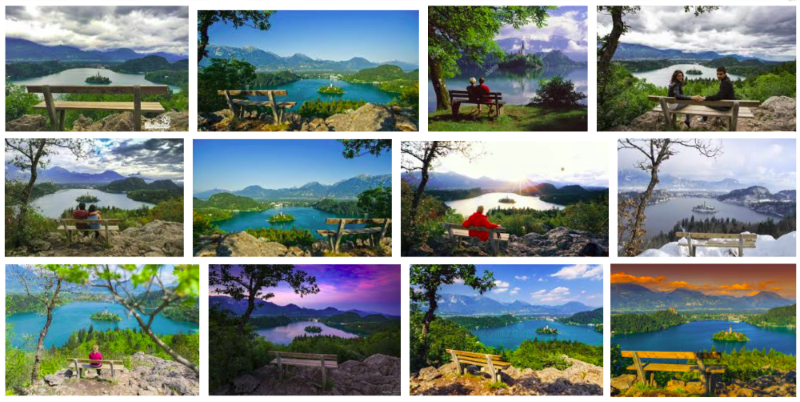
Source: Google image search
These are where you see a lot of Instagram shots, and you can find out how to take a picture like the ones above here. However, with about 90 minutes to two hours for the round trip you might want to find other options if just here for a short visit.
In which case, don’t worry, the view from Bled Castle is just as good. What’s more, if you’re really pressed for time then the short drive, bus ride or 15-minute walk up the hill will let you kill two or three birds with one stone – see the Castle, get the view, and eat one of those cakes, which we’ll get to, I promise.
The Castle, set atop a 130 m cliff, first appears in written records in 1011, and over the years the various owners have made their own changes to the property, making it the attractive mix of styles you’ll see today. Entrance costs €11 for adults, 7 for students and 5 for children enter (although free if you book a table at the restaurant), and inside you’ll find a museum, wine cellar, forge, printing press, chapel, knights’ hall restaurant, souvenir store and yet more impressive views of the area, which are not limited to those of the island.
What to Eat in Bled
Not every place has a “must eat” dish, but Bled surely does, and – as noted above – it’s kremšnita, which you’ll find everywhere. This is a truly delicious slab of custard, cream and pastry, perhaps best enjoyed with a cup of coffee. Another dish to consider, and before the kremšnita if you have enough time, would be fish from the lake.
If you’d like to make your own kremšnita, then you can see our recipe here. It failed, in part, but you can learn from our mistakes and / or simply appreciate the craft that goes into making “the real thing”.
Things to do with 24 to 48 hours in Bled
If you stay longer, and there are plenty hotels where you can spend the night, then you can really explore the area. In this regard hikers are in for a treat, with many paths and trails offering stunning views in the surrounding hills, or you can keep close to the water and follow the 6 km trail around the lake.
In the winter months skiing is possible, as is skating, while at other times you can enjoy a winter sport on rails with a toboggan ride – the details are here and a video is below.
Turning back to the lake itself,and season permitting, fishing is allowed, with Bled recently listed among the “ten best fishing holidays in Europe”.
While we’re on the subject of “best of” lists, golfers should note that in 2018 Royal Bled was added to the list of “best and most beautiful courses”, which is hardly surprising when you consider the views on offer as you walk from hole to hole.
Finally, if you’be spent a day or two exploring the area then consider taking a soak in one of the many spas in the town, with the water coming from the natural hot springs on the north-east side of the lake. In short, Bled offers much more than a cake with a view, and will reward visitors who choose to stay a day or two longer than most.
If you want to keep up with all the news about the area, including the things they don’t tell the tourists, then you can do that here, while if you want to visit the local tourist centre’s website to find out about the latest offers, then you can find that here.
STA, 5 April 2019 - The University of Maribor and the company SAB-LS signed a contract in Maribor on Friday, April 5, on the launch of the first Slovenian nanosatellite into orbit. Trisat is to fly into space on a light European Vega rocket that is to be launched from French Guiana in August.
Trisat has been developed at the Maribor Faculty of Electrical Engineering and Computer Science in cooperation with the Slovenian company Skylabs.
According to the chancellor of the Maribor university, Zdravko Kačič, the launch of the nanosatellite will be an important step in the internationalisation of the Slovenian space industry and a recognition for its technology.
"It is a proof that a student project can develop into an important project for the Slovenian industry and environment," he said.
"Nanosatellites are an important segment in the present-day space industry, because they can bring new technology into space in a cost-efficient and quick way. The new technology can thus be evaluated much quicker and cheaper, which reduces financial risks in this field," he said.
Trisat, weighing only 4.4 kilos, is capable of taking multispectral images of Earth in short-wave infrared spectrum with a camera unlike any other in space at the moment.
It will be deployed at the altitude of 500 kilometres in a Sun-synchronous orbit by the Vega rocket launched by Arianespace, a company developing launch solutions for the European Space Agency (ESA).
The rocket will carry some 50 satellites, including another Slovenian satellite that is larger than Trisat, called Nemo HD, which has been developed by Vesolje-SI, the Slovenian centre of excellence for space sciences and technologies.
The company SAB-LS will act as Arianespace's subcontractor for deploying nanosatellites as part of the ESA's programme Small Spacecraft Mission Service.
The signing of the contract, on Aptril 5, was also attended by Economic Development and Technology Minister Zdravko Počivalšek, who said the move set the course for the development of Slovenian technology and proved that Slovenia was an important partner in space technology and thus also of the ESA.
Slovenia became an associate member of the ESA at the end of 2016.
The head of the Trisat project, Iztok Kramberger, stressed that Trisat, whose lifespan has been estimated at six years, was almost entirely a product of Slovenian know-how. It has been developed and manufactured in Slovenia, except for the solar panels, he noted.
You can learn more about the project here
STA, 10 April 2019 - The University of Ljubljana has been ordered again to repay EUR 781,000 paid out in unwarranted standby bonuses to employees between 2012 and 2015 after the case was tried again, the national radio reports.
According to Radio Slovenija, the ruling, delivered by the Ljubljana District Court, is not yet final. It comes after the same court already ordered the university to repay the funds in 2017 but the Higher Court ordered a retrial.
The standby bonuses scandal at the University of Ljubljana erupted late in 2015 after an audit found that nine out of eleven colleges inspected paid out a total of EUR 781,000 in standby bonuses unlawfully between 2012 and 2014, allegedly to circumvent austerity measures.
The biggest offender was the Faculty of Economics, which adopted rules on such payments when its dean was Dušan Mramor, who later staunchly advocated austerity as finance minister in the Miro Cerar government. Mramor was also one of the recipients, along Maja Makovec Brenčič, who served as education minister in the Cerar government.
Mramor and his faculty associates are on trial in a separate case.
Unofficial reports alleged that a total of EUR 1.5m had been paid out between 2012 and 2015, but the colleges were not required to return the money they had secured from other sources.
The Education Ministry claimed the EUR 781,000 of its funding back arguing in the trial the money had been paid out ineligibly. The university insisted on its argument that the colleges paid out the bonuses from the funds they earned in commercial projects, rather than from public funds.
The university's lawyer, Dino Bauk, told the STA in March that the proof offered by the university was that the bonus- paying colleges generated more than EUR 86m in the market at the time, part of which was spent on their public activities. The university received EUR 16m less for those activities from the ministry. Bauk said at the time the university would appeal again should it lose the case.
All our stories on the University of Ljubljana can be found here
STA, 10 April 2019 - Prime Minister Marjan Šarec has expressed regret about the European Commission's lukewarm response to the media reports that Croatia had been behind the border arbitration scandal and that it had even tried to prevent the revelations from being published.
Arriving in Brussels on Wednesday for an EU summit dedicated to Brexit, Šarec said he had expected the Commission call for respect for the rule of law and declare pressure on the media unacceptable, in particular when they came from a neighbour country.
Šarec also commented on criticism at home that he was trying to create a state of emergency ahead of the EU elections. "There's no state of emergency. We have responded to the pressure, we've convened the National Security Council because there was a series of initiatives for that, and I find that's right."
"We cannot be humble all the time, turning the other cheek, we must speak out when things are wrong. We've done that too. This doesn't mean we're creating a state of emergency, there's no state of emergency," Šarec said.
Related: A timeline of the Slovenia-Croatia border dispute
The National Security Council met yesterday in the wake of a report by the commercial broadcaster POP TV that an intermediary working on behalf of the Croatian government had sought to prevent its news portal from running a story last week proving that the Croatian intelligence agency was responsible for intercepting the phone calls between Slovenia's judge and agent in the border arbitration in July 2015, which Croatia used as an excuse to withdraw from the arbitration process.
He said that it was a perfectly justified reaction to summon the Slovenian ambassador to Croatia to come to Ljubljana to explain the situation, and to summon the Croatian ambassador for talks, which was to show Slovenia as a sovereign country with its own position.
"If in the past our leaders were too servile, I cannot help it. I act the way I think is right," he said.
Asked whether he planned to discuss the matter with his Croatian counterpart Andrej Plenković and EU leaders, Šarec said that he always exchanged a few words with Plenković at the summit and that they would also have a word at the summit of China and 16 central and east European countries in Croatia's Split on Thursday.
"As far as I know Croatian journalists have joined in the protest against such interference in the media," Šarec said, referring to the Trade Union of Croatian Journalists backing the Slovenian Journalists' Association in condemning the pressure on POP TV.
Provided an opportunity, Šarec plans to have a word about the issue with Commission President Jean-Claude Juncker, but he does not believe he will get any other answer from the one already issued by the Commission. "The time has obviously come for elections and for change," he said.
Šarec will tell Plenković that the rule of law must be observed and that pressure on the media is unacceptable, he said. "We expect Croatia to refrain from such acts, to implement the arbitration award as soon as possible, and to stop with the practice that is not in Slovenia's or Croatia's interests."
The European Commission did not wish to comment on the revelations yesterday, saying this was a bilateral affair. The Commission reacted in a similar way the day before when asked to comment on Hungary's protest over the cover of the Mladina magazine portraying the Hungarian PM.
Šarec – May “brings nothing new to the table” on Brexit
STA, 10 April 2019 - Slovenia continues to support as short a delay of Brexit as possible, Prime Minister Marjan Šarec said as he arrived for the latest EU's Brexit summit in Brussels on Wednesday. We fear that Britain, should it hold the EU election and stay a member, would not be constructive, he said.
"You know how it is in politics. There are no guarantees in politics. All these safeguards to be adopted potentially can only be political. Should for instance a change of power occur in Great Britain, we have no way of knowing who comes after Theresa May and how they would behave," the Slovenian PM said in his doorstep statement.
He reiterated that what mattered most was not Britain but how the EU will function. "In case a blockade occurred, if we found ourselves in a situation where the institutions are blocked, we'd be in serious trouble."
Šarec does not know what to expect from tonight's developments, arguing that "Theresa May arrives each time to explain things while she brings nothing new to put on the table".
All our stories on Slovenia and Brexit are here
Bookmark this link and find the headlines faster each morning, or follow us on Facebook for all the news in your feed
A schedule of all the main events involving Slovenia this week can be found here, while all our stories on Slovenia, from newest to oldest, are here
This summary is provided by the STA
Šarec fears foul play by UK if Brexit is postponed until after EU vote
BRUSSELS, Belgium - Slovenia continues to support as short a delay of Brexit as possible, PM Marjan Šarec said as he arrived for the EU's Brexit summit. We fear that Britain, should it hold the EU election and stay a member, would not be constructive, he said. "There are no guarantees in politics. All these safeguards to be adopted potentially can only be political. Should for instance a change of power occur in Britain, we have no way of knowing who comes after Theresa May and how they would behave," Šarec said, noting a potential blockade of institutions would spell serious trouble.
Šarec regrets Brussels's lukewarm response to intel scandal
BRUSSELS, Belgium - Prime Minister Marjan Šarec expressed regret about the European Commission's lukewarm response to the media reports that Croatia had been behind the border arbitration scandal and that it had even tried to prevent the revelations from being published. Arriving for an EU summit dedicated to Brexit, Šarec said he had expected the Commission call for respect for the rule of law and declare pressure on the media unacceptable, in particular when they came from a neighbour country.
Parliament to debate foreign meddling in media
LJUBLJANA - The Modern Centre Party (SMC), backed by three fellow coalition parties, filed for a joint session of the parliamentary committees on foreign policy and culture to debate foreign countries' interference in the Slovenian media in a bid to get unanimous condemnation from politics. The initiative comes after Hungary protested over the cover of the Mladina magazine portraying PM Viktor Orban giving a Nazi salute, and after Croatia allegedly pressured POP TV not to run a story revealing that Croatia was behind the border arbitration wiretapping scandal.
Intelligence Oversight Commission to investigate Slovenian arbitration agent
LJUBLJANA - The chair of the parliamentary Intelligence Oversight Commission, Matej Tonin, announced the commission would look closer into why the Slovenian border arbitration agent, Simona Drenik, had gotten caught in the wiretaps of the Croatian intelligence agency in 2015. Tonin, who said the Slovenian side had information pointing to Croatianintelligence agency SOA's involvement already in December 2016, expressed his belief SOVA had drawn up an adequate counter-intelligence strategy before the wiretaps but that the instructions seemed to have been ignored by the Slovenian Foreign Ministry. He also said Croatian intelligence was very active in Slovenia.
FM Cerar discusses topical issues with MPs
LJUBLJANA - Foreign Minister Miro Cerar presented the content of his talks at this week's EU ministerial and other meetings to the Foreign Policy Committee, with the MPs inquiring about Slovenia's positions regarding Brexit, Libya, Venezuela, Catalonia and China. He said Slovenia supported another Brexit delay so that a deal could be endorsed in the British parliament. "We believe this is possible, but the ball is now in the British court." He also expressed concern regarding the situation getting complicated in Libya, also because instability in Algeria is increasing, which could affect the entire Mediterranean region.
Slovenia turning to Africa in effort to diversify exports
BRDO PRI KRANJU - As Slovenia's exports are slowing down after a record rise in 2018, the country has started looking to Africa for new business opportunities, government officials told a business internationalisation conference at Brdo pri Kranju. Slovenia needs to diversify its exports to markets outside the EU and find niche markets for high-tech products and services, said Economic Development and Technology Minister Zdravko Počivalšek. The ministry will provide EUR 9.7m in cohesion funds for this purpose in 2019.
Govt endorses bill on recourse for wiped out bank creditors
LJUBLJANA - The government endorsed on Tuesday a bill designed to provide recourse for holders of subordinated bank liabilities who were wiped out in the 2013 bank bailout. The Finance Ministry said the bill was in line with Constitutional Court recommendations and enabled sufficient access to recourse to subordinated creditors. Courts will have to weigh whether central bank Banka Slovenije, which opposes the bill, correctly applied the law in ordering the bailout and estimated bank losses. A bill addressing the situation was also adopted today by the National Council, which however wants the central bank sued by the state and not the creditors - these could be discoureged by the high procedural costs, it argues.
Govt targets public finance surplus of 1% of GDP next year
LJUBLJANA - The government adopted on Tuesday a blueprint to draft the general government sector budgets for 2020-2022 which sets a goal of revenue exceeding expenditure by 1% of GDP in 2020. The surplus is planned to increase further in 2021. While the general government revenue and expenditure were practically balanced in 2017, a surplus of 0.7% of GDP was recorded in 2018. The government also adopted the 2019-2020 National Reform Programme.
Commissioner says police in control of migration situation
LOGATEC - Police Commissioner Tatjana Bobnar asserted that police were in control of the migration situation despite the recent hike in illegal migrants. In the first three months of the year, the number of illegal crossings jumped by 146% compared to the same period in 2018. "The Schengen border is protected as it should be and the human rights of all foreigners are respected," she said at the opening of new offices of the Logatec police station.
IMAD sees favourable economic trends in Slovenia this year
LJUBLJANA - The government macroeconomic think tank says in its latest publication Economic Mirror that Slovenia recorded favourable economic trends and a growth in household revenue and spending at the beginning of 2019, while growth in the international environment is slowing down. Considering the expected trends in Slovenia's main eurozone trade partners, IMAD expects the growth of exports to slow down in the remainder of the year.
Lipica Stud Farm experiencing fast-rising visitor figures
LIPICA - The management of the Lipica Stud Farm reported a 6% rise in the number of visitors for last year and a 7% increase in total revenue. The farm, known for its white Lipizzaner horses, was visited by Economy Minister Zdravko Počivalšek, who expressed support to the current management in the face of pressure from a civil initiative. The total number of visitors exceeded 113,000 last year, the highest number in the last two decades. The positive trend is continuing this year, with a year-on-year increase of no less than 38% recorded in the first quarter. Revenue is up even more, by 44%.
AI in focus of annual Slovenian-German business conference
BLED - The Slovenian-German Chamber of Commerce organised the annual Day of Slovenian and German Business, which focussed on artificial intelligence. PM Marjan Šarec, noting that AI had become all-pervasive, said "those who fail to follow trends and do not have a pro-active approach will not be successful". Cooperation within the EU is key, as Europe has become slower in development compared to China, Russia, the US and India, he said. German Ambassador Klaus Riedel said AI was one of the most promising new technologies but also one that caused great concern.
Writers For Peace concerned over attack on Serbian journalist
LJUBLJANA - The PEN International Writers For Peace Committee (WfPC) adopted a resolution at the International Writers' Meeting in Slovenia last Friday, expressing concern over the attack on Serbian journalist Milan Jovanović in December 2018. Jovanović was shot at, while his house was set on fire and burnt down, following the publication of his articles in independent Serbian media which were critical of the government. The Slovenian-based committee, led by new president Emmanuel Pierrat, has already sent the resolution to the Serbian government.
Ministry allocates EUR 800,000 to ITF demining fund
LJUBLJANA - The Foreign Ministry will allocate EUR 775,000 to the ITF Enhancing Human Security demining fund to help fund eight development and humanitarian projects in areas affected by war or other disasters during the next two years. The ministry signed the agreement with the Slovenian-based ITF on Tuesday. Slovenia has been supporting the ITF since its inception in 1998, having allocated more than EUR 12m so far, including some EUR 5m through the Foreign Ministry.
Luka Koper group's net revenue up in first quarter
KOPER - Port operator Luka Koper generated almost EUR 60m in net revenue in the first quarter of the year, up 8% compared to the same period in 2018. Its transshipment decreased by 3% to around 6 million tonnes, Luka Koper said in a press release. "The group's transshipment was reduced mostly due to strong fluctuations in individual cargo categories. On the other hand, the sale revenue indicates a positive growth trend and stable business management."
Industrial output down in February
LJUBLJANA - Slovenia's industrial output in February was down 1.1% over January and 4.3% higher year-on-year, the Statistics Office said. Industrial sales revenue was up by 0.5% in monthly and by 6.9% in annual comparisons.
Fewer overweight children, alcohol still cause for concern
LJUBLJANA - The latest data from the Health in Municipalities project, launched by the National Institute of Public Health's (NIJZ) in 2016, shows improvements in several fields. The number of overweight children fell in 60% of Slovenia's municipalities and there were fewer cases of tick-borne encephalitis. However, alcohol consumption remains a cause for concern, as the share of accidents caused by drunk drivers has increased over the past year.
Visiting Ljubljana? Check out what's on this week
The Slovenian International Ladies' Association's (SILA) first Spring Soirée was a total success, and it was an amazing evening to see the main ballroom of the Grand Hotel Union full of people having fun after one and a half months of hard work and preparations. The event was sold out – 250 guests attended and there were still more who wanted to come, but couldn’t get a ticket. Each table was named after a famous woman from a different country, for example – Slovenia was represented by Ana Roš, name the Best Female Chef in the World in 2017. And there was something magical in the air when you entered the glittering hall, all in pink, with the tulips in the glass vases, so elegant and joyful.
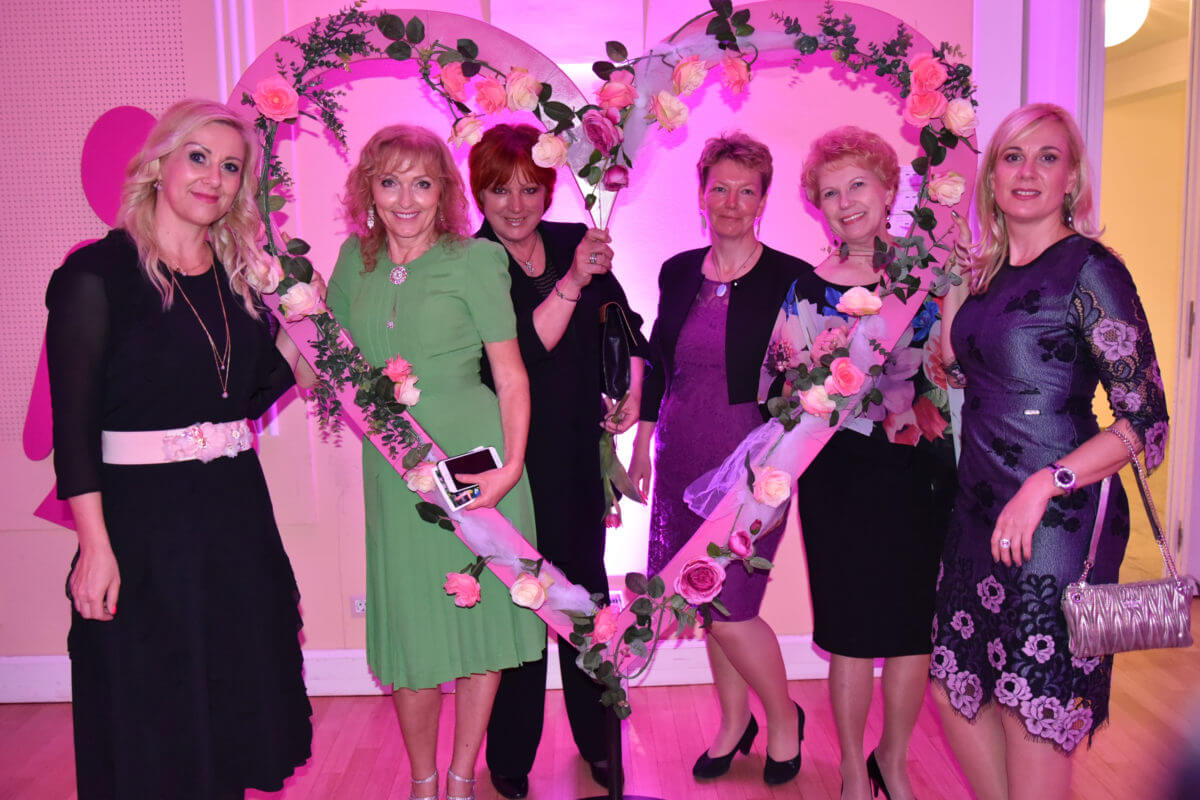
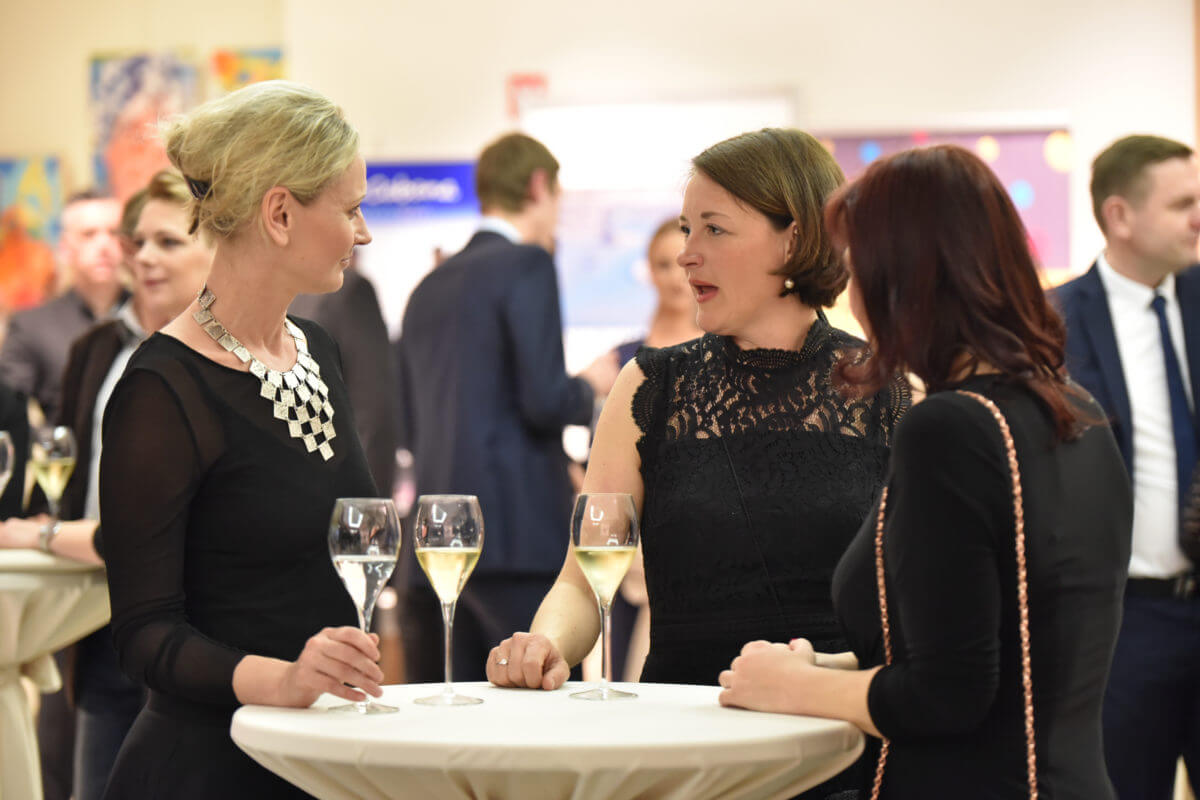
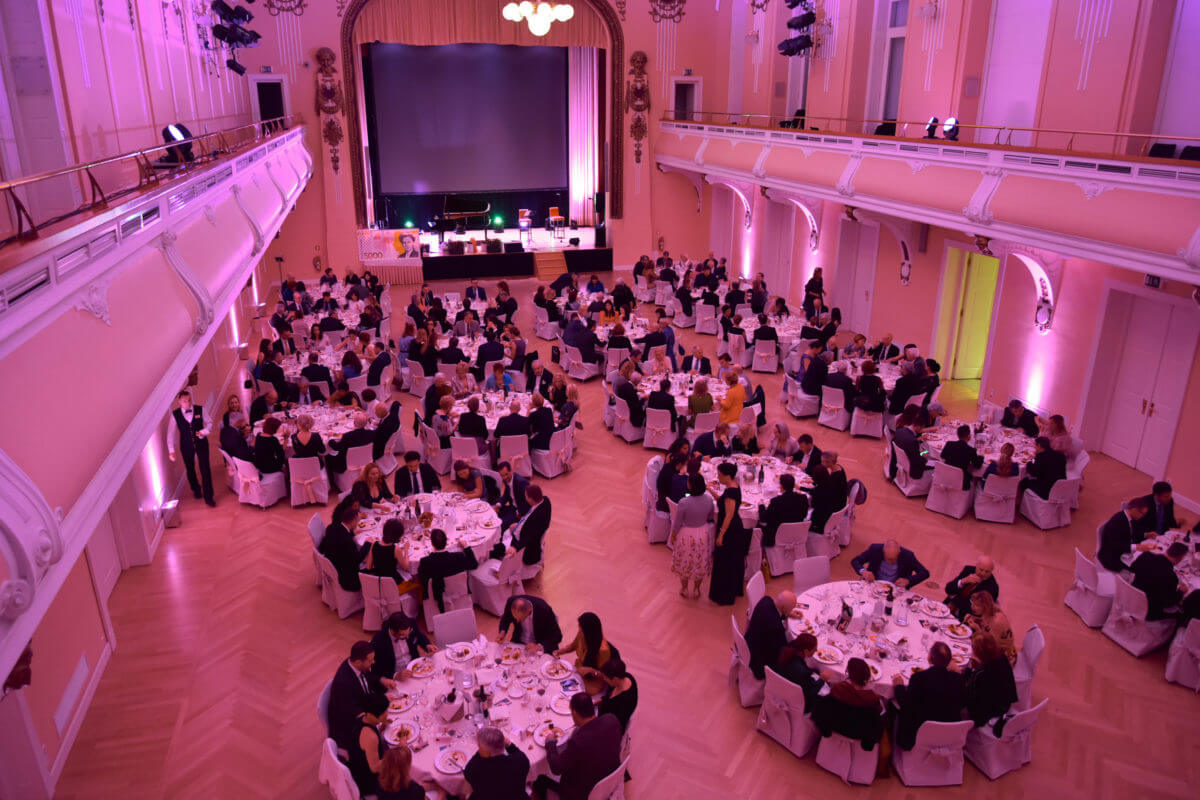
This year's event was different from the years before, because it was organised to support a charity project, Europa Donna, which helps women with breast cancer. At the end of the evening a cheque for €7,500 was presented to Tanja Spanič, the president of Europa Donna Slovenia, and for the whole of Europe, too. Another very important goal was to celebrate women, because March is meant to be the month of women, while a third aim, and not the least, was to enjoy the evening with friends, which was organised under the honorary patronage of the President of the Republic of Slovenia Borut Pahor, and co-hosted by the Turkish Embassy.
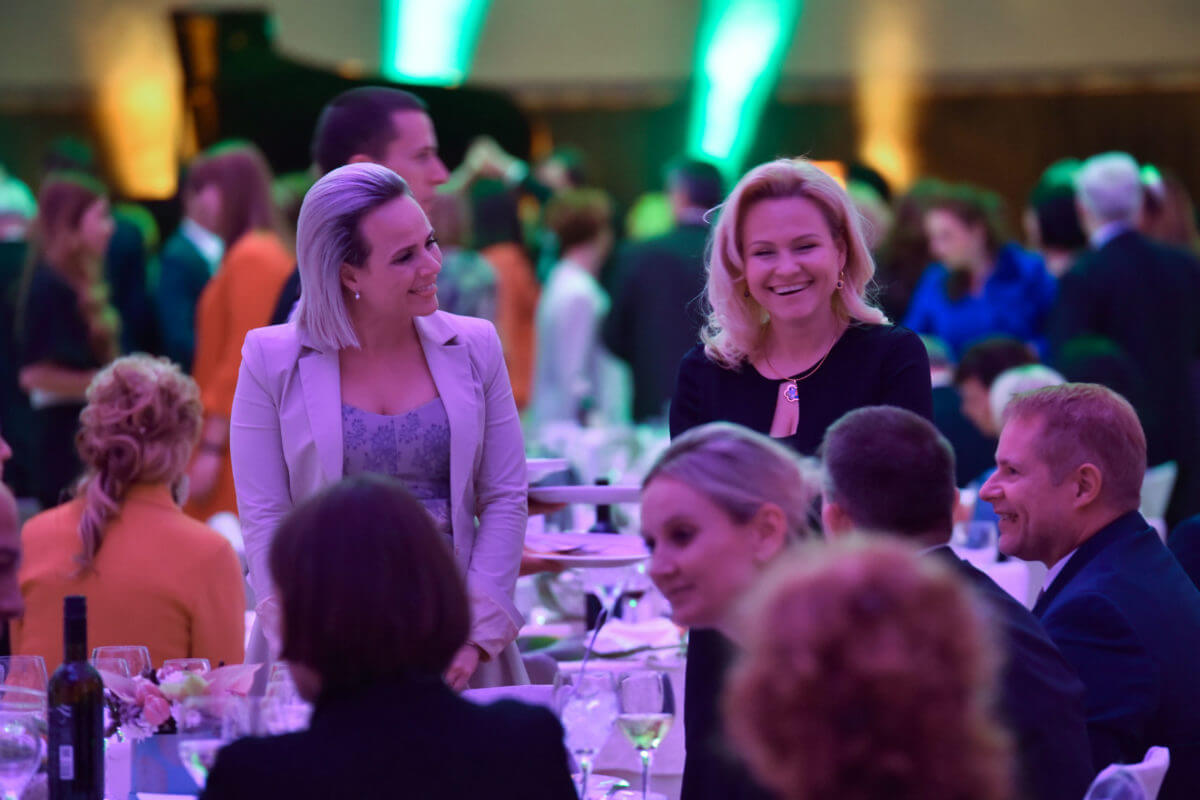
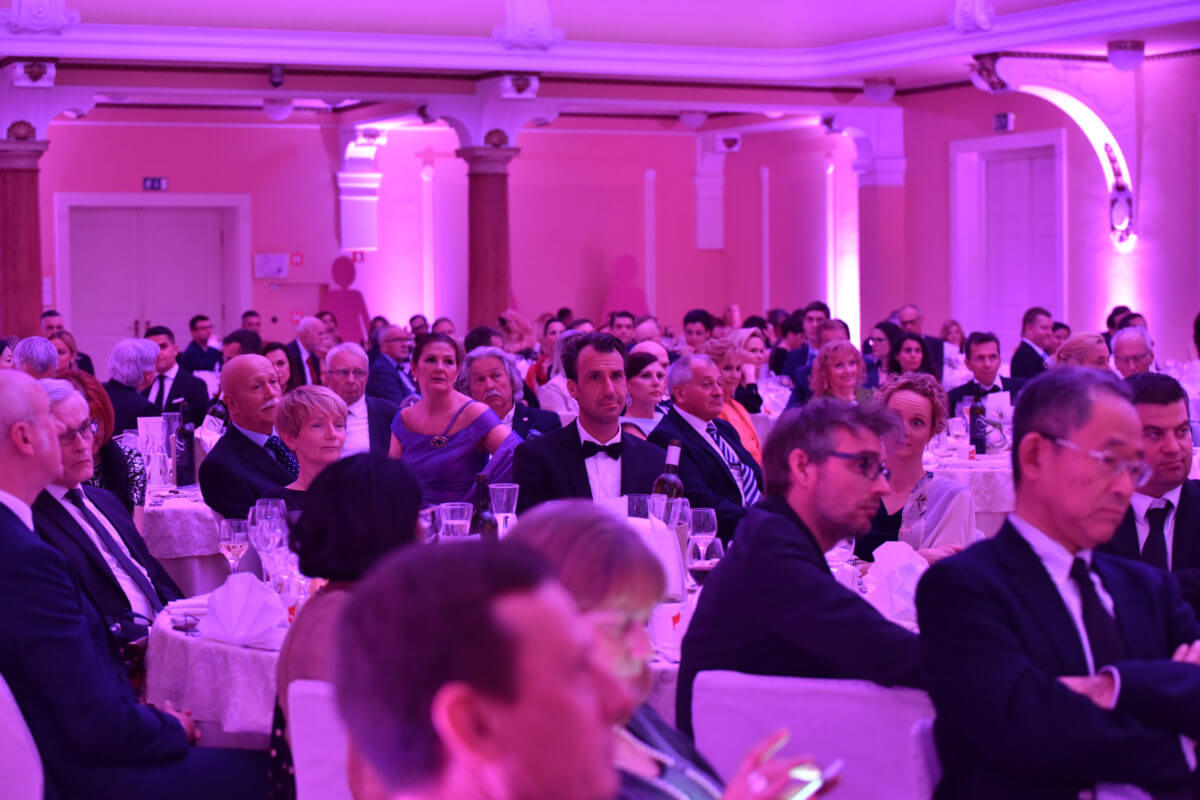
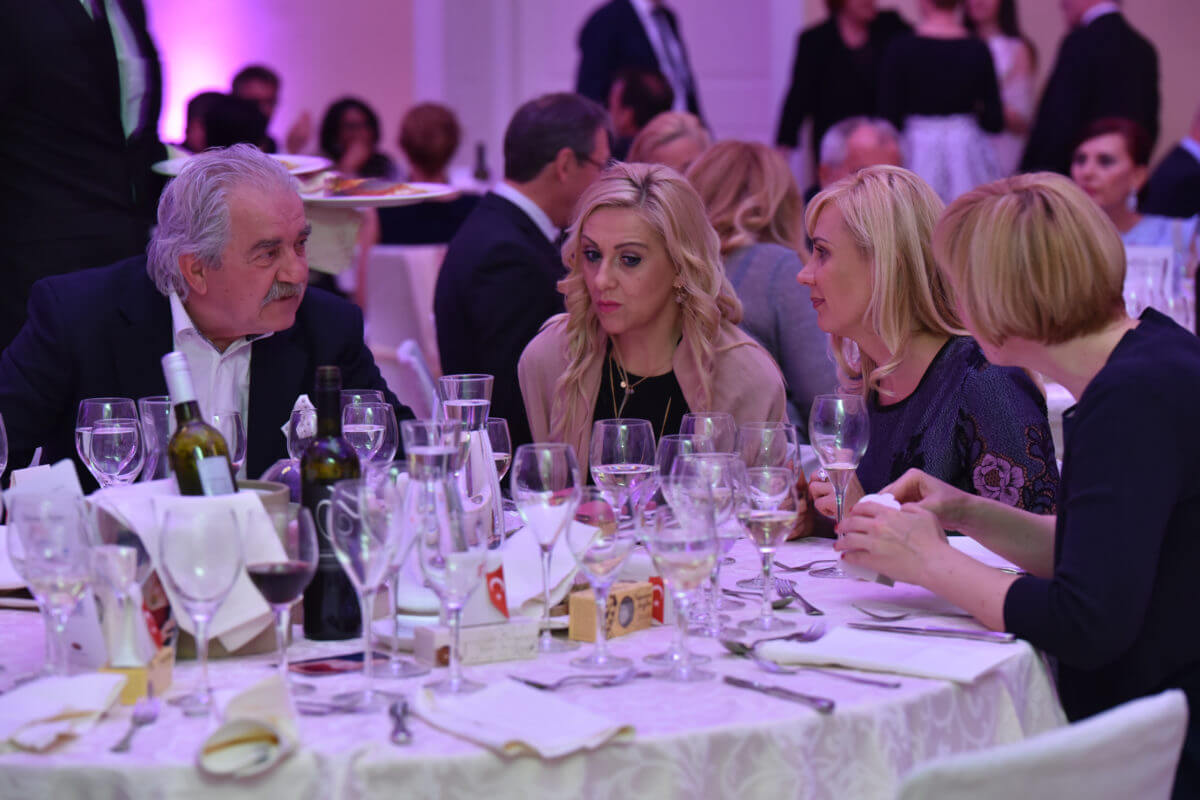
We listened to speeches made by Her Excellency the Ambassador of Turkey, Mrs. Esen Altug, and also to those of Tanja Bogataj, Emilia Stojmenova, Danica Purg, Tanja Skaza, and Tanja Spanič, all wonderful women who have are having a significant impact on Slovenia. There were also artists whose work delighted and inspired us throughout the evening: Inga Ulokina, Lara Oprešnik, our Ivana Jelisavčić with Matjaž Kosem, Manca Izmajlova with Benjamin Izmajlov, dancing couple Maja Pucelj and Peter Files, Emilia Debska and the women who appeared in the fashion show.
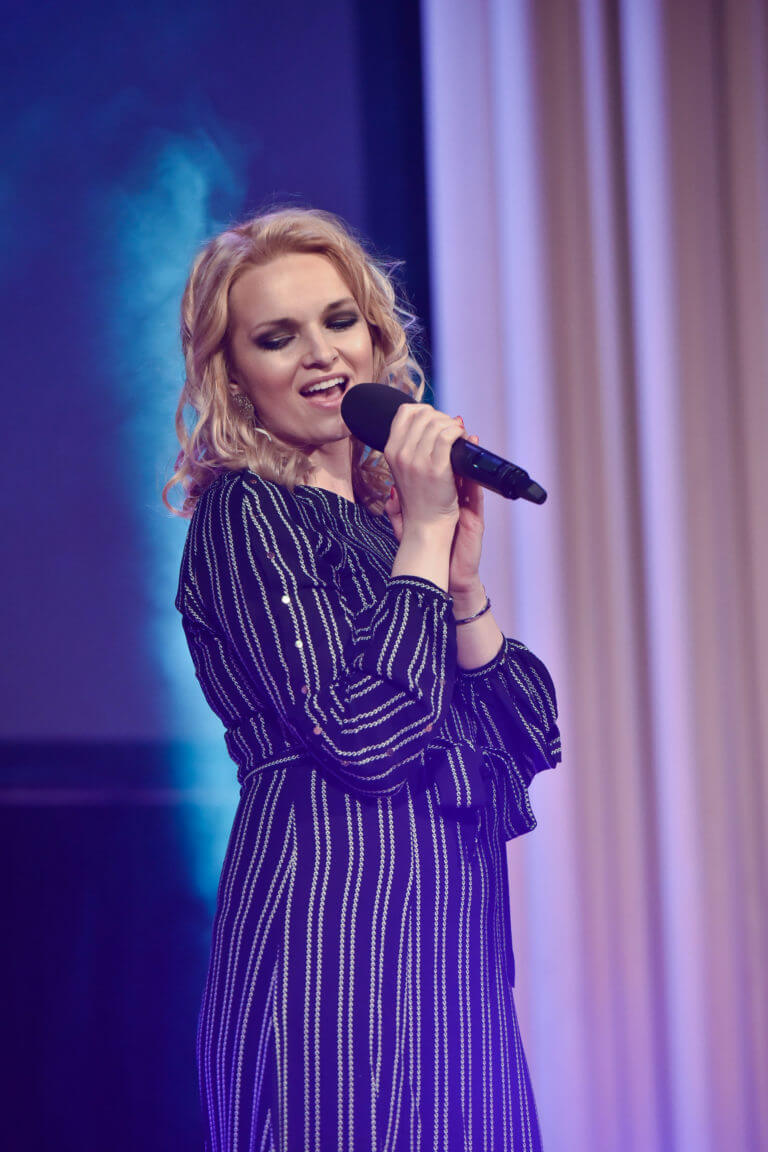
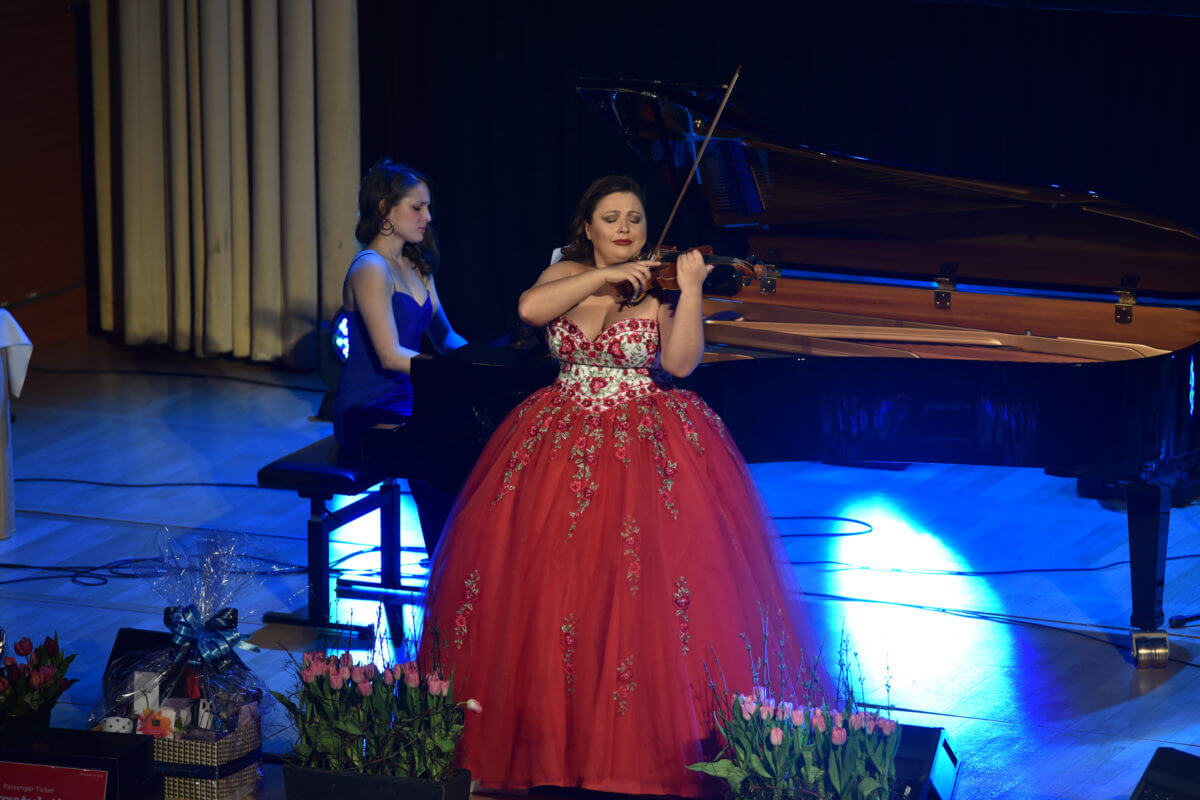

In the foyer there were sponsors, along with welcoming drinks. Member of SILA who paint also showed their works here. To add to the fun, and excitement, there was a lucky draw during the evening, as well as a silent auction. Then, with the formal part of the evening completed, the guests all danced to the sounds of DJ music. If you came, then I hope you enjoyed the evening as much as I did, and if you couldn’t come then I hope you get a chance to attend next year, or to join SILA and take part in some of its many other events.
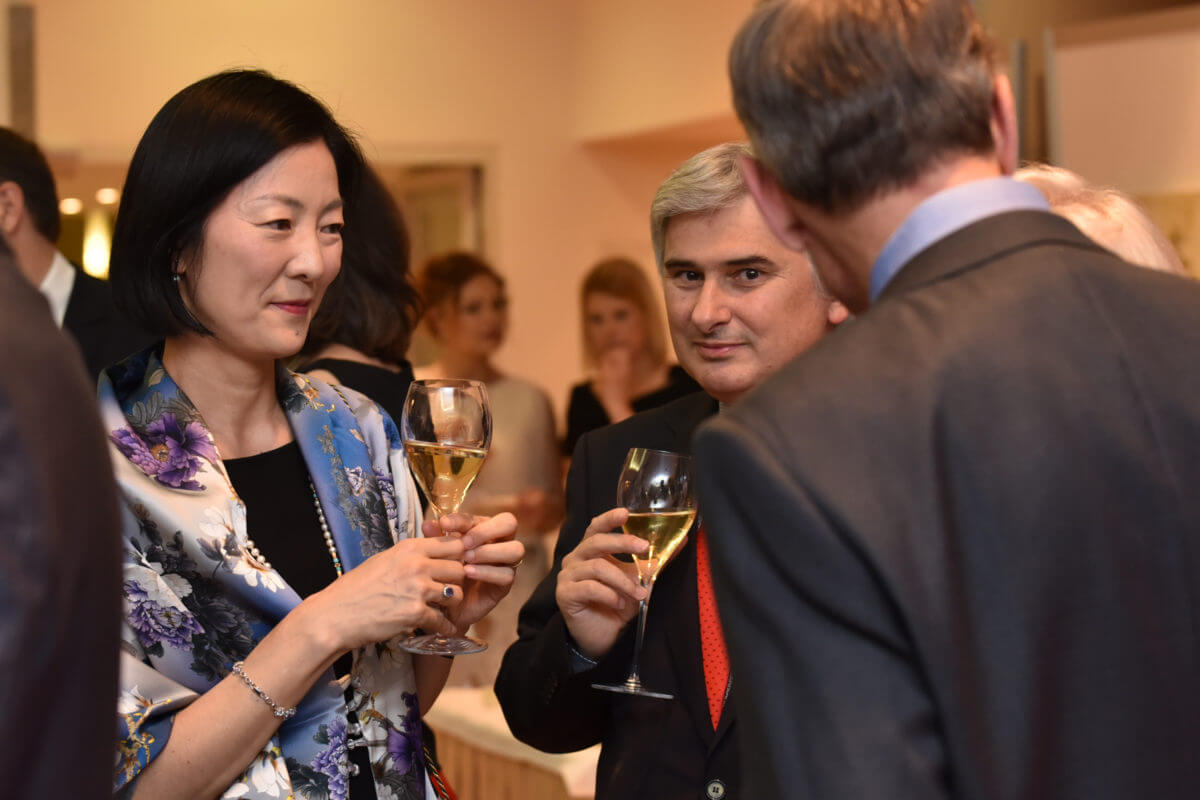

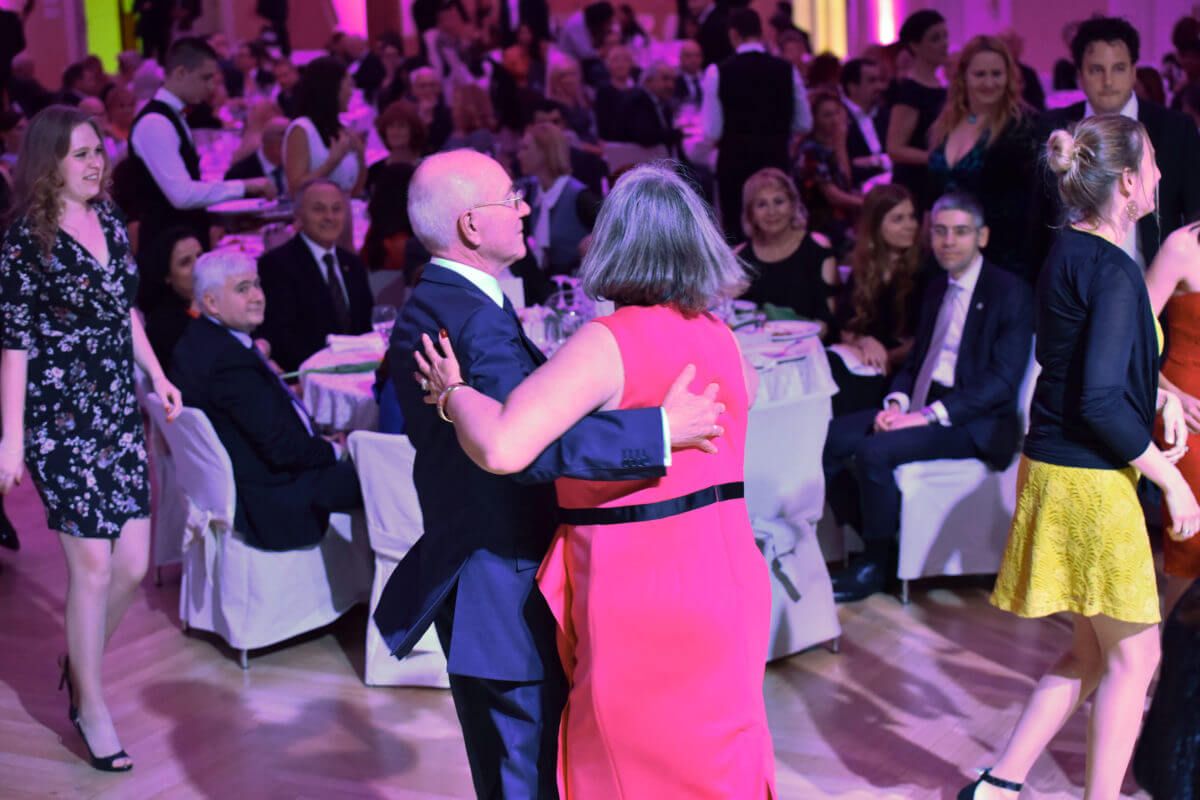
I should, of course, thank SILA’s president, Marta Berglez, who first proposed the idea of a Spring Soireé just a short time ago, in February. She was the soul and the leader of all the preparations, as well as a speaker on the evening along with Valeria Koval. I would also like to thank all of the Spring Soireé committee for their efforts in making the evening such as success: Marta Berglez, Anne Gwenaëlle Vrtunski, Zita Majoros, Hilâl Easley, Marisa Kogovšek, Ellen Vredevoort, Aldegonda Mieke Caris, Lali Sladjana Ilić, Tatjana Struna Berden, Valerija Koval, Helen Mina and myself, Mojca Slana, as well as everyone who supported the event.
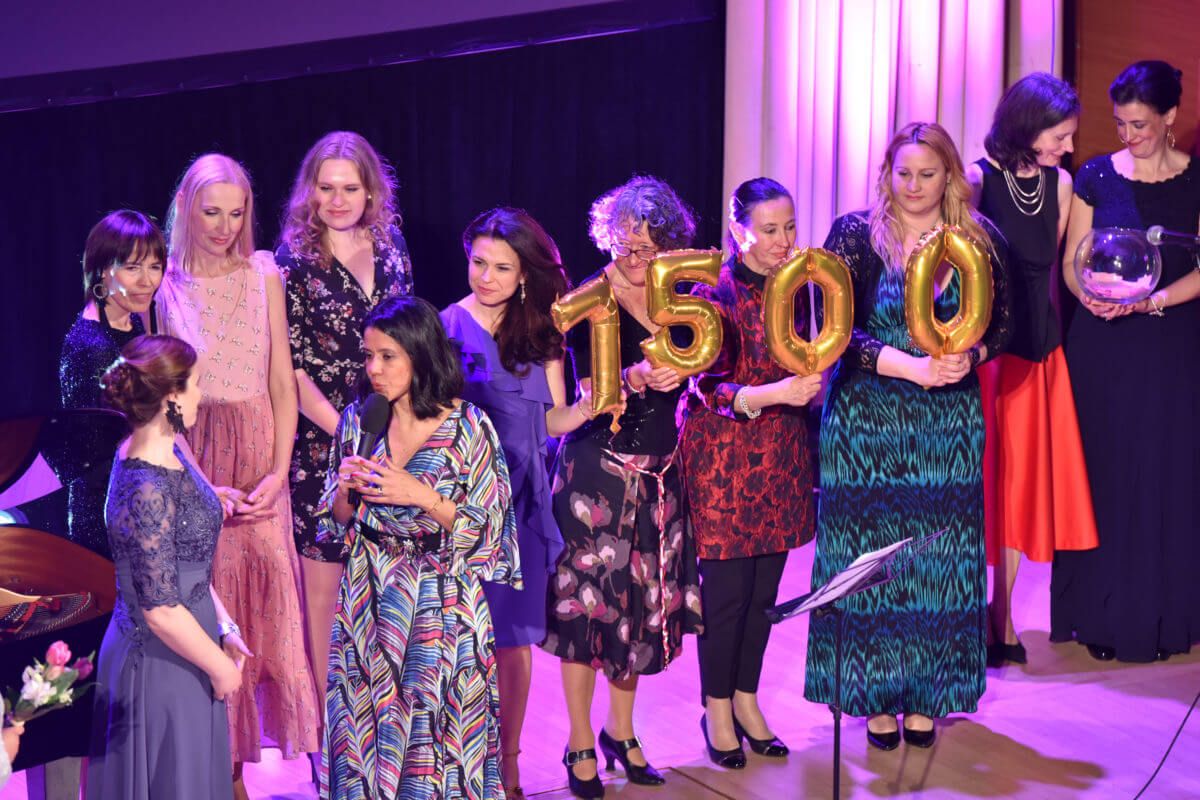
You can learn more about the work and activities of SILA here, while you can see many (many) more pictures from the event here
STA, 10 April 2018 - Hunger for energy resources is almost as old as humankind, but the reasons behind it vary. The first to drill holes in the north-east Slovenia was the German army, and now the efforts to extract gas are driven by greed and the desire to make quick profit, says Delo in Wednesday's front-page commentary.
Quick profit is what British investors were promising to all those who wanted to invest in the project of exploiting the reserves of gas and some oil in the south-eastern-most part of the country.
They want to drill another 12 or 24 holes and use hydraulic fracturing to extract the gas and oil.
But people are distrustful. They used to have free gas and jobs, but now foreign investors came who only want profit.
They are using all means available to get what they want, including an agency to persuade the public and decision-makers, the British ambassador and a campaign and threats on social media.
Because of appeals, the procedure at the Environment Agency is slow. The agency has issued a permit for a planned gas processing plant, which will not be built anyway, but not yet a permit for hydraulic fracturing, which people oppose.
"The people have the feeling that the area along the Mura river cannot be seen very well from Ljubljana. Indeed, when it rained heavily in the capital, the area bathed in the sun."
People in Ljubljana are making plans to build dams on Mura and are stepping up pressure to exploit the natural resources in the area, although the people there want a green development.
"The gas that is coming out of the holes on its own is enough, the rest is just greed," Delo says in the commentary entitled ‘Gas for the Profit of a Handful’.
All our stories on hydraulic stimulation in Slovenia are here
STA 10 April 2019 - As Slovenia's exports are slowing down after a record 2018, the country has started looking to Africa for new business opportunities, government officials told a business internationalisation conference at Brdo pri Kranju on Wednesday.
Slovenia needs to diversify its exports to markets outside the EU and find niche markets for high-tech products and services, according to Economic Development and Technology Minister Zdravko Počivalšek.
This year, the ministry will provide EUR 9.7m in cohesion funds for this purpose, he added, noting that Slovenia was among the few EU countries that were net exporters, its exports amounting to EUR 38.8bn in 2018.
Trade grew by 10% last year, reaching EUR 74bn, with more than half of the figure generated in Austria, Croatia, France and Germany, said Počivalšek, underlining the need to diversify.
"Africa remains an unexplored market, especially sub-Saharan Africa," according to Dobran Božič, a state secretary at the Foreign Ministry, which provides support to companies branching out to foreign markets.
"Africa is developing fast and the needs of its developing economy are enormous." In Africa, it is key that the state opens doors to potential exporters, as this is a signal to future customers that these are serious companies with serious plans, said Božič.
Prime Minister Marjan Šarec also said that the state would continue to support the economy by opening doors to foreign markets. But the government cannot do everything, he said, underlining the importance of cooperation and good organisation as well as the need to be proactive.
Africa has a population of one billion and a number of countries making a significant amount of investments, added Počivalšek. "The companies that have not yet entered Africa have missed a business opportunity."
Export diversification seems even more necessary in the face of Brexit, although a Brexit risk study for Slovenia shows that the country would only face problems in the case of a no-deal Brexit, according to Počivalšek.
But even in this worst-case scenario, the situation would stabilise after an initial shock following the UK's exit from the EU, according to the minister.
Foreign Minister Miro Cerar, meanwhile, underlined it was key for Slovenia to be an open country "not just in terms of politics but above all in terms of economy".
"Only by supporting our entrepreneurs in their efforts to enter foreign markets and attracting investors with good business models ... will Slovenia walk the path of a good country," said Cerar.
Entrepreneurs will have an easier time doing business abroad or with foreign partners in Slovenia if the country has a strong brand known for a good education system, science institutions, good judiciary and a good economic system.
Economy Ministry State Secretary Aleš Cantarutti told the conference that Slovenia aimed to see its exports grow by 5% in 2019 as well as in 2020, especially on the account of SMEs, whose exports are expected to grow by two percentage points annually each year.
He pointed out that services accounted for only 20% of Slovenia's exports although they accounted for 65% of the country's GDP, adding that there were still many business opportunities in this field.
The ministry will also focus on boosting foreign direct investments (FDI), which equal 32% of the country's GDP. This is relatively low, considering 65% in the Czech Republic and the EU average of 59%.
According to Cantarutti, Slovenia will focus on attracting FDI from Austria, Germany, Italy, Japan, Switzerland and the US, with the ministry providing about EUR 4m in incentives.




